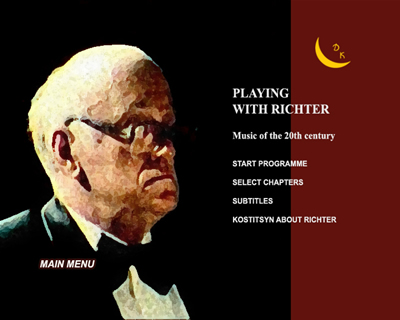DVD

Sviatoslav Richter (1915-1997), one of the greatest pianists of the twentieth century, was born in Zhitomir, Ukraine, into a family of musicians. His talent was recognized and encouraged from a very early age. The Richters soon moved from Zhitomir to Odessa, a provincial city in Southern Ukraine. Theophil Richter, father of Sviatoslav, was a professor at Odessa Conservatory. At the same time and in the same city lived also David Oistrakh and Emil Gilels. By the age of eight Richter played opera scores by Wagner and at age nineteen he gave his first solo piano concert.
We often hear funny things about Richter. For example, that his development as a pianist started when 22-year-old Richter first met Heinrich Neuhaus in Moscow. In fact when Neuhaus listened to Richter's playing he said that there was nothing he could teach him. Being already an accomplished pianist Richter never passed the exam to enter the Moscow
Conservatory as a student. He was enrolled without examination after Neuhaus listened to his playing. Can we imagine the same happening at our state music schools which charge 100$ only for applying and where composers and performers are evaluated by accountants according to form-filling instead of personal inspiration and experience? Indeed, Neuhaus knew that real diplomas are issued in Heaven.
Richter won the All-Union Competition in 1945 and was awarded the Stalin Prize in 1949. Being a jury member at the First Tchaikovsky Competition in 1958 he awarded van Cliburn one hundred points out of possible ten.
The communist regime kept Soviet artists on a short leash and there was a reason for that. Too often Soviet artists chose not to return. The first time Richter was allowed to cross the border with the West was at the end of 1960. That was his debut in the US with the Second Concerto by Brahms conducted by Erich Leinsdorf. After that Richter played seven recitals over ten days in Carnegie Hall. He became an extremely busy performer. However he also became known for cancellations of his performances at the very last minute. He tried to avoid travelling by air. The exhausting life of a travelling concert pianist was not his cup of
tea.
Richter preferred to stay in France and Germany. The environment around Tours in France reminded him of Zhitomir. In 1964, Richter founded an annual festival - the "Fetes Musicales en Touraine" at Meslay. He also established the December Nights Festival which annually takes place at the Pushkin Museum of Fine Arts in Moscow.
Richter's repertoire was vast, though the music he performed was selected very consciously. Besides basic piano repertoire he loved to play sonatas by Schubert and Haydn which evoked delight in his audiences. As time passed Richter's interpretations became more and more rigid and restrained, though each composer was always for him a special world and Richter treated each of them very differently, naturally and easily. A natural ability to merge different styles and epochs was probably his most impressive talent, though most people first of all valued his unlimited abilities as a virtuoso.
After 1980, the only light he allowed in the concert hall was focused on the piano and around the same time he stopped playing by heart though his memory was always extraordinary.
Richter's last concert was in Lubeck, Germany, in March, 1995. He was eighty years old and in poor health. On the program were three Haydn Sonatas and Variations by Beethoven. Richter died in Moscow on August 1, 1997.
CDK Music, 2005. 65'. DVD 5. Subtitles in English, Japanese, German, French, Spanish, Italian. PAL. zone zero. 12 tracks.
- Sergei Prokofiev. Sonata for flute(violin) and piano. Marina Vorozhtsova, flute. Track #3. 2:39 -10:15.
- Benjamin Britten. “La cremae”(“Tears”) for viola and piano. Excerpt. Yuri Bashmet, viola. Track #4. 10:35 - 16:12.
- Benjamin Britten. Sonata for cello and piano. Movements 4 and 5. Nataly Gutman, cello. Tracks #5 & 6. 16:40 - 18:55 & 18:55 - 21:30.
Movements
Yuri Nikolajevsky, conductor. Track #7. 24:28 - 35:30
Trio
5. Dmitri Shostakovich. Trio#2 for piano, violin and cello.
Oleg Kagan, violin; Nataly Gutman, cello. Tracks# 9-12. 37:11 - 64:40
Design by Evgeni Kostitsyn